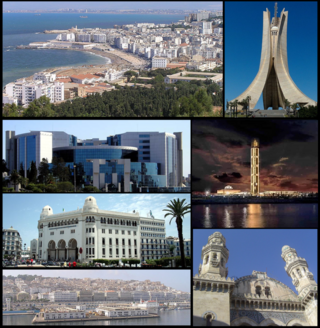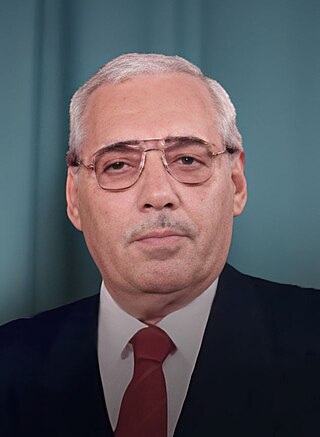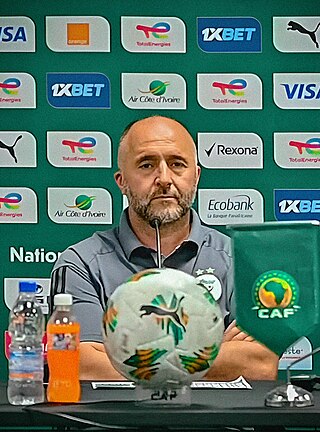Contents
| |||||
| Decades: | |||||
|---|---|---|---|---|---|
| See also: | |||||
Events in the year 1993 in Algeria
| |||||
| Decades: | |||||
|---|---|---|---|---|---|
| See also: | |||||
Events in the year 1993 in Algeria

Algeria, officially the People's Democratic Republic of Algeria, is a country in the Maghreb region of North Africa. It is bordered to the northeast by Tunisia; to the east by Libya; to the southeast by Niger; to the southwest by Mali, Mauritania, and Western Sahara; to the west by Morocco; and to the north by the Mediterranean Sea. Algeria has a semi-arid climate, with the Sahara desert dominating most of the territory except for its fertile and mountainous north, where most of the population is concentrated. Spanning 2,381,741 square kilometres (919,595 sq mi), it is the world's tenth-largest nation by area, and the largest nation in Africa. With a population of 44 million, Algeria is the tenth-most populous country in Africa, and the 32nd-most populous country in the world. The capital and largest city is Algiers, located in the far north on the Mediterranean coast.

Algiers is the capital and largest city of Algeria, located in the north-central part of the country. The city's population at the 2008 census was 2,988,145 and in 2020 was estimated to be around 4,500,000.

Tunisia, officially the Republic of Tunisia, is the northernmost country in Africa. It is a part of the Maghreb region of North Africa, bordered by Algeria to the west and southwest, Libya to the southeast, and the Mediterranean Sea to the north and east. Tunisia also shares maritime borders with Italy through the islands of Sicily and Sardinia to the north and Malta to the east. It features the archaeological sites of Carthage dating back to the 9th century BC, as well as the Great Mosque of Kairouan. Known for its ancient architecture, souks, and blue coasts, it covers 163,610 km2 (63,170 sq mi), and has a population of 12.1 million. It contains the eastern end of the Atlas Mountains and the northern reaches of the Sahara desert; much of its remaining territory is arable land. Its 1,300 km (810 mi) of coastline includes the African conjunction of the western and eastern parts of the Mediterranean Basin. Tunisia is home to Africa's northernmost point, Cape Angela. Located on the northeastern coast, Tunis is the capital and largest city of the country, which is itself named after Tunis. The official language of Tunisia is Modern Standard Arabic. The vast majority of Tunisia's population is Arab and Muslim. Vernacular Tunisian Arabic is the most spoken, and French also serves as an administrative and educational language in some contexts, but it has no official status.

1928 (MCMXXVIII) was a leap year starting on Sunday of the Gregorian calendar, the 1928th year of the Common Era (CE) and Anno Domini (AD) designations, the 928th year of the 2nd millennium, the 28th year of the 20th century, and the 9th year of the 1920s decade.
1920 (MCMXX) was a leap year starting on Thursday of the Gregorian calendar and a leap year starting on Wednesday of the Julian calendar, the 1920th year of the Common Era (CE) and Anno Domini (AD) designations, the 920th year of the 2nd millennium, the 20th year of the 20th century, and the 1st year of the 1920s decade. As of the start of 1920, the Gregorian calendar was 13 days ahead of the Julian calendar, which remained in localized use until 1923.
1925 (MCMXXV) was a common year starting on Thursday of the Gregorian calendar, the 1925th year of the Common Era (CE) and Anno Domini (AD) designations, the 925th year of the 2nd millennium, the 25th year of the 20th century, and the 6th year of the 1920s decade.
1958 (MCMLVIII) was a common year starting on Wednesday of the Gregorian calendar, the 1958th year of the Common Era (CE) and Anno Domini (AD) designations, the 958th year of the 2nd millennium, the 58th year of the 20th century, and the 9th year of the 1950s decade.

The Maghreb, also known as the Arab Maghreb and Northwest Africa, is the western part of the Arab world. The region comprises western and central North Africa, including Algeria, Libya, Mauritania, Morocco, and Tunisia. The Maghreb also includes the disputed territory of Western Sahara. As of 2018, the region had a population of over 100 million people.

The president of the People's Democratic Republic of Algeria is the head of state and chief executive of Algeria, as well as the commander-in-chief of the Algerian People's National Armed Forces.

Ahmed Ouyahia is an Algerian politician who was Prime Minister of Algeria four times. A career diplomat, he also served as Minister of Justice, and he was one of the founders of the Democratic National Rally (RND) as well as the party's secretary-general. He is considered by Western observers to be close to the military of Algeria and a member of the "eradicator" faction in the 1990s civil war against Islamist militants. Ouyahia resigned as prime minister in March 2019 following President Bouteflika's announcement that he would not seek reelection, and Ouyahia was arrested in June 2019 for crimes related to corruption. He was later convicted and is currently serving 19 years in jail.

Théodore Steeg was a lawyer and professor of philosophy who became Prime Minister of France.

Ahmed Ben Bella was an Algerian politician, soldier and socialist revolutionary who served as the head of government of Algeria from 27 September 1962 to 15 September 1963 and then the first president of Algeria from 15 September 1963 to 19 June 1965.

Ali Kafi was an Algerian politician who was Chairman of the High Council of State and acting President from 1992 to 1994.
The High Council of State in Algeria was a collective presidency set up by the Algerian High Council of Security on 14 January 1992 following the annulled elections in December 1991.

Islamic music may refer to religious music, as performed in Islamic public services or private devotions, or more generally to musical traditions of the Muslim world. The heartland of Islam is the Middle East, North Africa, the Horn of Africa, Balkans, and West Africa, Iran, Central Asia, and South Asia. Due to Islam being a multi-ethnic religion, the musical expression of its adherents is vastly diverse. Indigenous traditions of various part have influenced the musical styles popular among Muslims today. The word "music" in Arabic, the language of Islam, is defined more narrowly than in English or some other languages, and "its concept" was at least originally "reserved for secular art music; separate names and concepts belonged to folk songs and to religious chants".

Djamel Belmadi is a professional football coach and former player who last managed the Algeria national team. Born in France, he represented Algeria internationally between 2000 and 2004.

The Kabyle people are a Berber ethnic group indigenous to Kabylia in the north of Algeria, spread across the Atlas Mountains, 160 kilometres (100 mi) east of Algiers. They represent the largest Berber population of Algeria and the second largest in North Africa.

Entente Sportive Sétifienne, known as Entente de Sétif, commonly referred to as ES Sétif or ESS for short, is an Algerian professional football club based in Sétif. The club was founded in 1958 and its colours are black and white. Their home stadium, the 8 May 1945 Stadium, has a capacity of 18,000 spectators. The club is currently playing in the Algerian Ligue Professionnelle 1.

Abdelaziz Djerad is an Algerian politician and diplomat who served as Prime Minister of Algeria from 28 December 2019 to 30 June 2021. In September 2021, he was appointed ambassador to Sweden.
Events from the year 1992 in Algeria